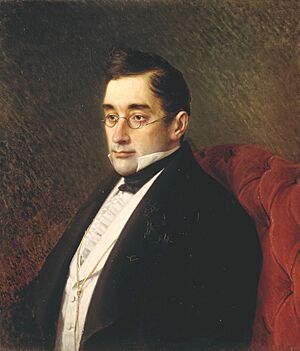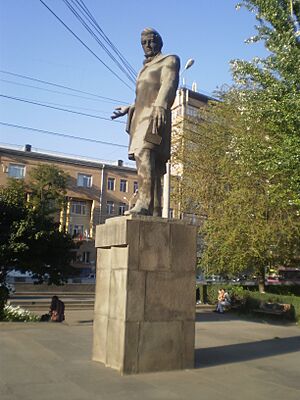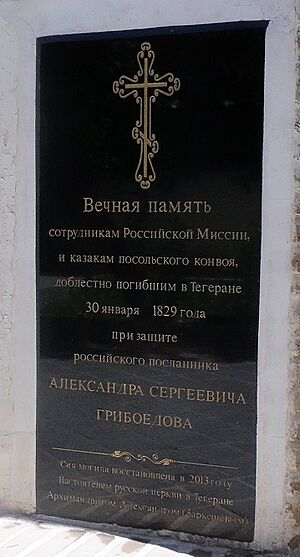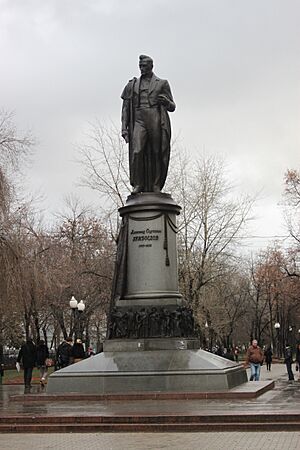Alexander Griboyedov facts for kids
Quick facts for kids
Alexander Griboyedov
|
|
|---|---|

Portrait by Ivan Kramskoi
|
|
| Russian Ambassador to Iran | |
| In office 1828–1829 |
|
| Monarch | Nicholas I of Russia |
| Personal details | |
| Born |
Alexander Sergeyevich Griboyedov
4 January 1795 Moscow, Russian Empire |
| Died | 11 February 1829 (aged 34) Tehran, Qajar Iran |
| Resting place | Tbilisi, Georgia |
| Nationality | Russian |
| Spouse | Nino Chavchavadze |
| Alma mater | Imperial Moscow University (1808) |
| Occupation | Diplomat, Playwright, Poet, and Composer |
| Signature | |
Alexander Sergeyevich Griboyedov (Russian: Александр Сергеевич Грибоедов; 15 January 1795 – 11 February 1829) was a talented Russian diplomat, playwright, poet, and composer. He is most famous for his 1823 comedy play called Woe from Wit.
Griboyedov served as Russia's ambassador to Persia. He died during an attack on the Russian embassy in Tehran. This happened because many people in Persia were angry about treaties that had given parts of their land to Russia. Griboyedov played an important part in one of these treaties.
Contents
Early Life and Education
Alexander Griboyedov was born in Moscow. The exact year of his birth is not fully known, but it was likely 1795. He was a very smart student. He earned a master's degree in philology (the study of language and literature) from Moscow University. He even started a program to get a doctorate degree.
In 1812, he left his studies to join the military. He became an officer in a hussar (a type of cavalry soldier) regiment. He left the military in 1816 and began working for the government. In 1818, he became a secretary at the Russian office in Persia. Later, he moved to Georgia.
Musical Talents
Griboyedov was also very musical. He played the piano and composed several waltzes. Only two of his waltzes still exist today. He also wrote music for stage plays. He even studied music with famous musicians like John Field.
His Famous Play
Griboyedov wrote a verse comedy called The Young Spouses in 1816. But his most famous work is Woe from Wit (Gore ot Uma). This play is a funny but sharp criticism of Russian high society.
The play shows different types of people in society. For example, there's Famusov, who dislikes new ideas, and Molchalin, who tries to please everyone. The main character, Chatsky, is a clever and sarcastic person who has returned from Europe. He points out the weaknesses of others. His words reflected the feelings of young people who wanted change in Russia.
Griboyedov finished Woe from Wit in 1823. However, the government censors would not allow it to be published. Many handwritten copies were made and shared secretly. Griboyedov never saw his play fully published during his lifetime. It was finally published four years after his death, in 1833.
After facing disappointment, Griboyedov returned to Georgia. During the Russo-Persian War of 1826–1828, he used his language skills to help General Ivan Paskevich. After the war, he helped with the negotiations for the Treaty of Turkmenchay.
Death in Persia

Several months after marrying Nino Chavchavadze, Griboyedov was sent to Persia as a special ambassador. At this time, there was strong anti-Russian feeling in Persia. This was because of the recent war and the difficult Treaty of Turkmenchay.
Soon after Griboyedov arrived in Tehran, a large crowd attacked the Russian embassy. The trouble started when an Armenian man and two Armenian women, who had been living in the Shah's palace, sought safety at the Russian embassy. The Treaty of Turkmenchay allowed Armenians and Georgians in Persia to return to their homelands. However, the Shah demanded that Griboyedov return the three people. Griboyedov refused.
This decision caused a huge uproar in the city. Thousands of Persians surrounded the Russian building, demanding the people be handed over. Religious leaders encouraged the crowd, saying it was right to free Muslim women from non-believers.
Griboyedov and his staff prepared for a fight. They sealed all the windows and doors. A small group of Cossack soldiers tried to protect the embassy. They held off the crowd for over an hour. But eventually, the mob broke through the roof and then the ceiling.
Griboyedov and the Cossacks fought bravely, but they were overwhelmed. Griboyedov was among the first to be killed. Almost everyone in the embassy died during the attack.
Several months later, Griboyedov's friend, the famous poet Alexander Pushkin, was traveling in the Caucasus. He met some men from Tehran who were transporting an oxcart. They told Pushkin they were carrying the ambassador's body to Tiflis (now Tbilisi).
Griboyedov was buried in Tbilisi, at the monastery of St. David. His widow, Nino, remained loyal to his memory for the rest of her life.
To make up for the attack and Griboyedov's death, the Shah of Persia sent his grandson to Russia. He also gave the Russian Tsar, Nicholas I, a famous jewel called the Shah Diamond.
Legacy and Memory

Alexander Griboyedov's life has been seen as a story of a literary hero. He himself seemed to view his life as an adventure. His letters and writings show a life that was exciting and dramatic.
Many places are named after Griboyedov. For example, a main setting in the famous novel The Master and Margarita is named after him. The Griboyedov Canal in Central Saint Petersburg is also named in his honor. One of the main streets in Tbilisi, Georgia, is called Griboyedov Street.
In 1944, on what would have been Griboyedov's 150th birthday, a big celebration was held in Russia. Important officials, military leaders, writers, and artists attended.
Commemoration
Many monuments, streets, theaters, and museums honor Alexander Griboyedov.
Monuments
- In Saint Petersburg, there is a monument to Griboyedov.
- In Yerevan, Armenia, there is a statue of him.
- A monument was put up in Alushta in 2002.
- In Moscow, his monument is on Chistoprudny Boulevard.
- He is also honored in the "Millennium of Russia" monument in Veliky Novgorod.
- A bust of Griboyedov is in Volgograd.
- In Tbilisi, Georgia, there is a monument to him on the Kura riverbank.
- The Russian embassy in Tehran has a monument to Griboyedov.
- A bust of Griboyedov is on the outside of the Odessa Opera and Ballet Theater.
Theaters
- The Smolensk Drama Theater is named after A.S. Griboyedov.
- There is a theater in Tbilisi named after him.
Museum
- The State Historical, Cultural and Natural Museum-Reserve of A.S. Griboyedov “Khmelita” is in Vyazemsky District, Smolensk Oblast, Russia.
Libraries
- The Library of National Literature in Saint-Peterburg is named after A.S. Griboyedov.
- The Central Library in Moscow is also named after him.
Other Honors
- The novel The Death of Vazir-Mukhtar (1928) by Yury Tynyanov is about Griboyedov's last years.
- A scholarship at Lomonosov Moscow State University is named after A. S. Griboyedov.
- An Aeroflot airplane, an Airbus 330-243, is named after A.S. Griboyedov.
- In 1995, the Central Bank of Russia issued a coin to celebrate his 200th birthday.
- A medal called "A.S. Griboedov, 1795-1829" is given to writers and publishers.
- The Soviet Union released two stamps featuring Griboyedov in 1954 and 1959.
Compositions
Waltzes
- Waltz in E minor
- Waltz in Ab major
Opera
- 1824: Who is a Brother, Who is a Sister, or Deception for Deception (He wrote the music for this stage play, working with P. A. Vyazemsky).
See Also
 In Spanish: Aleksandr Griboyédov para niños
In Spanish: Aleksandr Griboyédov para niños
- Vatslav Vorovsky, Soviet envoy at the Conference of Lausanne, assassinated in 1923
- Pyotr Voykov, Soviet ambassador to Poland, assassinated in 1927
- Andrei Karlov, Russian ambassador to Turkey, assassinated in 2016
 | Chris Smalls |
 | Fred Hampton |
 | Ralph Abernathy |



